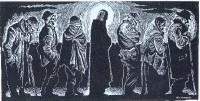

Karen House Catholic Worker
 |
Karen House Catholic Worker |
The RoundTable Destructive Engagement, Expendable Peoples Spring 1998
Major Articles
|
Download Entire Issue by Clicking Image Above |
|||
Karen House: 1840 Hogan St. Saint Louis, MO 63106 Contact Us: 314.621.4052 |
Regular Features
|
Why This Issue: "We were just sitting there talking," to repeat a famous phrase, those planning this issue, trying to come up with a theme. One striking impression we all shared was how conditions for the poor had so worsened in the last decade.
I mentioned first learning in Nicaraguan Spanish the words gente desponible- throwaway people, disposable or expendable people. Nicaraguan campesinos explained how their lives no vale nade- are not worth anything--because they and their country are poor and dark-skinned.
Someone else remembered how the U.S. government said that South Africa, on the other hand, merited "constructive engagement" in efforts to remove apartheid. No economic boycotts or other negative behavior against South Africa: heaven forbid! Rather, "constructive engagement" meant economic and political business as usual. South Africa, after all, was a wealthy country ruled by a civilized white elite.
Thus the theme for this issue was born. Destructive Engagement: Expendable People. Virginia Druhe discusses the effects on Cuba of one hundred years of destructive engagement. Mark Chmiel then takes us half a world away to point up some of the inconsistencies- would one want to be so bold as to say hypocrisies?—of U.S. policy toward Indonesia.
Since we have learned what "constructive engagement" means, Bill Ramsey continues the education process and teaches us about "counterinsurgency" in both past and present incarnations, whose victims are especially expendable. Noble G.B. Oboni-Nwibari describes how his Ogoni indigenous people in Nigeria became expendable after Shell Oil discovered oil on Ogoni land in 1958 and how he himself had to flee for his life. Mira Tanna movingly describes the effects on Iraq's expendable people, such as the 600,000 children under the age of five, who have died as a result of U.N./U.S. sanctions.
Instead of the "From Abroad" section, Beth Craig offers a review of the book, Madeleine Debrel, A Life Beyond Boundaries. After news from Little House and Karen House, Ellen Rehg leaves us in Round Table Talk with some provocative thoughts on the automobile and the wisdom of children in that regard.
-Mary Dutcher |
The RoundTable is 24 pages long. To download, you'll need the most recent version of Adobe Acrobat. Download Adobe Acrobat 8 here (it's easy AND free!)
Search all of the RoundTable issues for an author, subject or title here: |